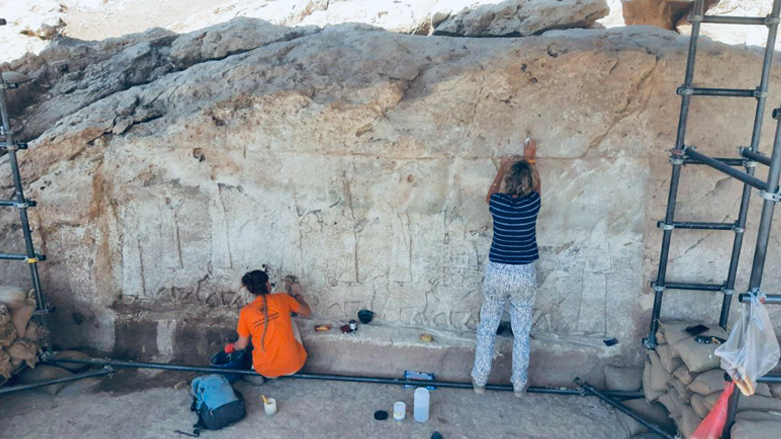PHOTOS: First archeological park in Iraq
Bekas Jamal Brifkani, Duhok general director of antiquities told Kurdistan 24, this park can also be described as the first open museum in the Kurdistan region and Iraq.

Duhok (Kurdistan 24) – The Faida Archaeological Park has been opened in Duhok province, the first and biggest archeological park in the Kurdistan region and Iraq.
Only around 20 km south of the city of Duhok is located Faida archeological complex, on October 16 the park was opened as the first phase and part of four other archeological sites that will together form the biggest archeological park in the Kurdistan Region and Iraq.

Kurdistan regional government minister of municipalities and tourism along with the Duhok governor, Italian Ambassador in Iraq, Italian Consul in Erbil, Duhok general director of antiquities, UNESCO director in Iraq, and Rector of the Italian University of Udine were all present in Duhok for the opening of the archeological park.
Bekas Jamal Brifkani, Duhok general director of antiquities told Kurdistan 24, this park can also be described as the first open museum in the Kurdistan region and Iraq.
The 130 square km archeological park consists of five parts, Khanas reliefs, Bandawa, Halamata cave reliefs, Charwana, and Faida archeological complex.
Faida archeological complex which showcases a wonder of ancient architecture is the first part that was opened on October 16, standing alone on 102 hectares and it has 13 rock reliefs each 4 to 5 meters long and one to two meter high.
2800 years ago Assyrian king tried to provide water for Nineveh for the purpose of irrigation, constructing this unique architecture using amazing technics, Khanas reliefs were also part of it.

According to Dr. Bekas, they plan to continue their work in order to complete the rest of the park by 2026.
Cultural centers, green space, security, and preservation unit stations will be set up in the park, it will even have playgrounds for children to entertain children of tourists.
Currently, the visits to the park are limited until we have enough security guards in place and the park is completely finished, with this start we hope to attract more foreign archeological teams and more budget to enable us to complete this park.’ Dr. Bekas added.
He was optimistic that this park can attract tourists and provide income and job opportunities for locals.

KRG has been allocating 900 million Iraqi Dinars annually aiming at renovating and protecting archeological sites in the Kurdistan region.
The Italian University of Udine in collaboration with the Kurdistan regional government has recorded 1160 archeological sites so far in Duhok province, with the Italian government allocating a total of 3 million and 133 thousand euros in the process.
Professor Danielle Morandi from the University of Udine explained that the Faida Archaeological Park, an archaeological park dedicated to the ancient Assyrian complex, is the result of a four-year work of documentation, conservation, and protection carried out by the University of Udine and its numerous partners, in collaboration with the Duhok Directorate of Antiquities.

The Faida complex is the work of King Sennacherib (704-681 BC) or, perhaps, formerly of his father Sargon II (721-705 BC), it consists of an irrigation canal over ten kilometers long and 4 meters wide, and a series of monumental rock reliefs representing the builder sovereign in prayer in front of the seven main deities of the Assyrian pantheon (Ashur, Mullissu, Sin, Nabu, Shamash, Adad, Ishtar).
Italian Ambassador to Iraq Maurizio Greganti and Consul Michele Camerota, visited the National Museum of Archeology in Duhok the day before opening,
Greganti praised the work that teams of archeologists led by Professor Danielle Morandi, from the University of Udine along with the Duhok antiquities directorate have accomplished so far.
1160 archeological sites have been registered in cooperation between the University of Udine and the Duhok antiquities directorate.
The Italian government will continue to support such work through the next two years.’ Grenati said.
A free virtual tour of Faida can be experienced via this link